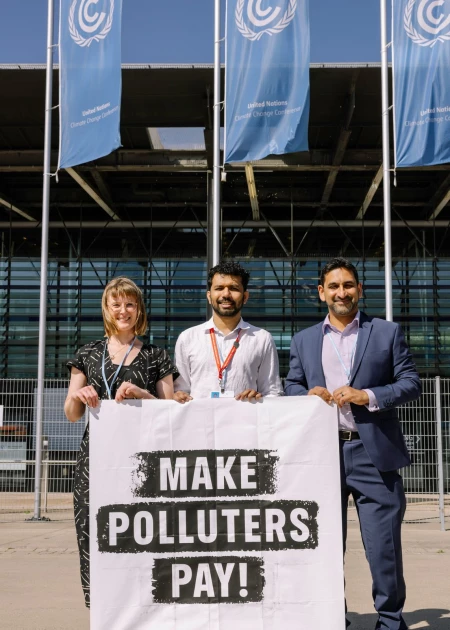A new international survey has revealed overwhelming global support for taxing oil, gas, and coal corporations to fund climate loss and damage payments, as pressure mounts on governments to hold major polluters accountable.
The study, conducted by data firm Dynata and unveiled at the ongoing UN Climate Meetings (SB62) in Bonn, found that eight in ten respondents across 13 countries, including Kenya, South Africa, and most G7 nations, support imposing higher taxes on fossil fuel companies to pay for climate-related destruction. The findings were released alongside the launch of the Polluters Pay Pact, a global alliance of climate-impacted communities demanding corporate accountability for environmental harm.
The results show broad consensus across age, income, and political groups, particularly in Kenya and South Africa, highlighting a strong public mandate for a “polluter-pays” approach to climate justice.
“People are literally feeling the heat and footing the bill for disasters driven by fossil-fuel profits,” said Sherelee Odayar, Oil and Gas Campaigner for Greenpeace Africa. “Governments have a popular mandate to make oil, gas, and coal corporations pay their fair share for the floods, droughts, and hunger they’ve helped unleash.”
Representing Kenya at the Bonn summit, Special Climate Envoy Ali Mohamed emphasized Africa’s call for progressive carbon taxation. He pointed to the Nairobi Declaration, adopted during the inaugural Africa Climate Summit, which advocates for a global tax regime targeting fossil fuel trade.
“Kenya co-chairs the Global Solidarity Levies Taskforce,” Mohamed said. “We’re working with a coalition of countries to develop taxes that reflect the true cost of pollution. The principle is simple: those who profit from greenhouse gas emissions must help fund recovery and adaptation for communities hit hardest.”
The findings also reflect growing frustration with the political influence of wealthy elites and polluting industries, which many feel have obstructed climate progress. Mads Christensen, Executive Director of Greenpeace International, said the public is demanding action.
“The fingerprints of fossil fuel giants are all over the climate disasters we’re seeing,” Christensen said. “It’s time for governments to make polluters, not victims, pay. This could unlock billions for real climate solutions.”
The report comes as countries debate how to raise $1.3 trillion annually in climate finance for Global South nations by 2035. Activists say a corporate carbon tax could form a critical part of that effort, providing funding while delivering long-awaited justice.
Written By Rodney Mbua



















